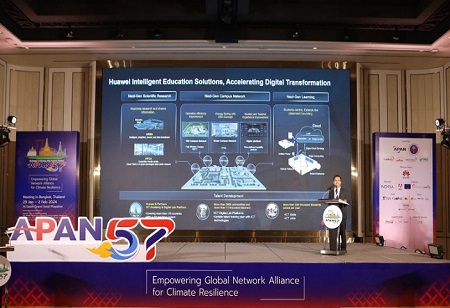Huawei encouraged advancements in the education sector by introducing the "AirEngine Wi-Fi 7," an enterprise-class solution representing the latest generation of Wi-Fi standards. This technology provides a more seamless and dependable wireless network, particularly in scenarios with high-density, high-bandwidth, and low-latency requirements, such as accessing the metaverse and employing Augmented Reality/Virtual Reality (AR/VR) for educational purposes.
"The trend in the education industry is now evolving from digitalization to intelligent infrastructure", stated Mr. Sheldon Wang, Vice President of Enterprise Business Group, Huawei Technologies (Thailand) Co., Ltd. He went on to reveal during the 57th Asia-Pacific Advanced Network (APAN57) meeting that Huawei is fully committed to integrating ICT such as connectivity, cloud computing, big data, and artificial intelligence throughout the entire education process to promote innovation in teaching, scientific research, management, and services.
Utilizing technologies like optical networks and Wi-Fi 7, Huawei has seamlessly fused wired, wireless, office, and IoT networks to establish connectivity among campus networks, education and research networks, and the Internet. This integration forms a unified, secure, stable, and intelligent network, enhancing the service system's capacity and elevating the overall user experience.
Contemporary teaching and learning methods have evolved from conventional blackboard use to the incorporation of multimedia tools, transitioning from fixed-location learning to flexible, anytime-anywhere access. Moreover, the shift from one-way lectures to a more student-centric approach is evident. In the realm of scientific research, addressing intricate computing and analytics tasks is imperative, relying heavily on technologies such as high-performance computing (HPC), high-performance data analytics (HPDA), big data, and artificial intelligence. These technologies demand robust Wi-Fi solutions with high bandwidth and stability.
At the event, Huawei also revealed that it is preparing to bring knowledge and expertise from its global industry work to support the development of ICT infrastructure, which it sees as a key factor in the digital transformation of the education sector, along with key solutions such as "Intelligent Education" that will accelerate digital transformation that focuses on technology that supports research. Creating an intelligent environment for educational institutions and classrooms will help students be able to learn in a realistic way and promote better skill development, which includes the introduction of the latest technologies like "Wi-Fi 7" to enhance the capabilities of education through new wireless technology standards with wider channels and lower delay rates.
At the event, Huawei also organized a special forum "Thailand Medical Research HPDA Infrastructure Innovation Panel", inviting experts from leading medical universities, including Khon Kaen University (KKU), Siriraj Hospital, National Biobank of Thailand, and King Mongkut's Institute of Technology Ladkrabang to exchange ideas and preparedness guidelines to support the development of scientific and medical research. Huawei's Scientific Research HPDA Solution adopts an ultra-high-density design both in terms of capacity and performance to make significant savings in equipment room space, bringing down the Total Cost of Ownership (TCO).
Dr. Sissades Tongsima, Director of the National Biobank of Thailand, NSTDA, shared: “Some innovative technologies were developed during the COVID-19 pandemic, such as Bluetooth Stethoscopes, the implementation of which helped maintain social distance between doctors and patients. Many innovations also originated from co-development and collaboration". At APAN57, Huawei actively engaged in showcasing technological advancements and innovations for education under the theme "Leading Infrastructure to Accelerate Education Intelligence." The emphasis was on upgrading infrastructure to expedite technology transformation, ultimately supporting the evolution of education for the next generation.

